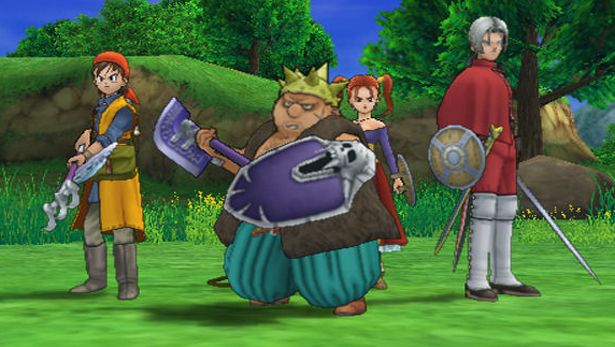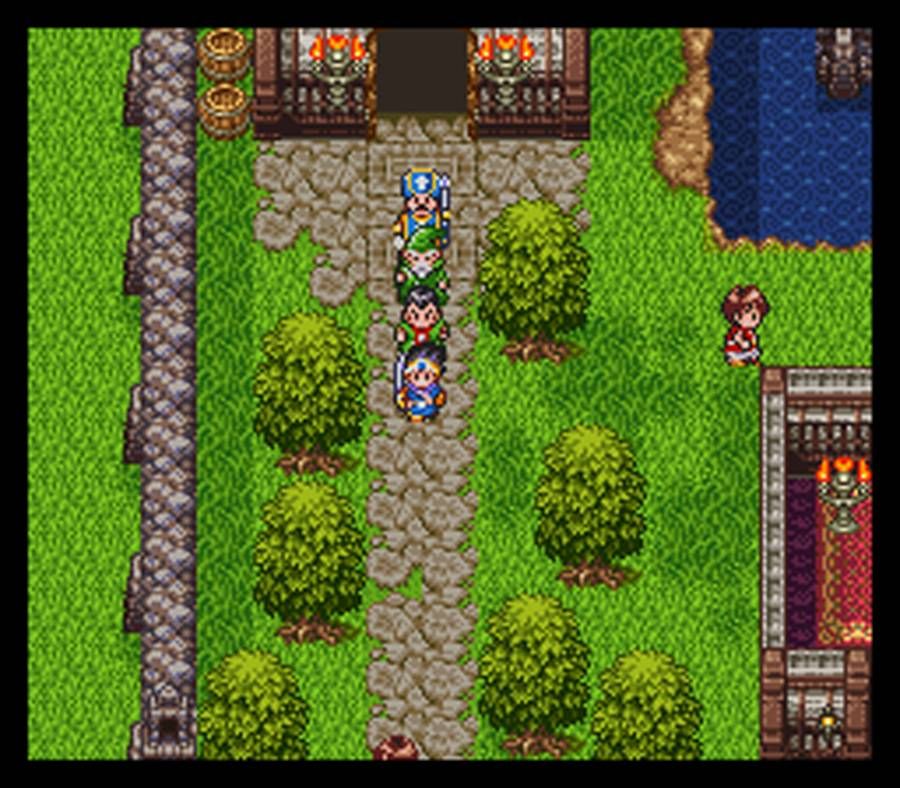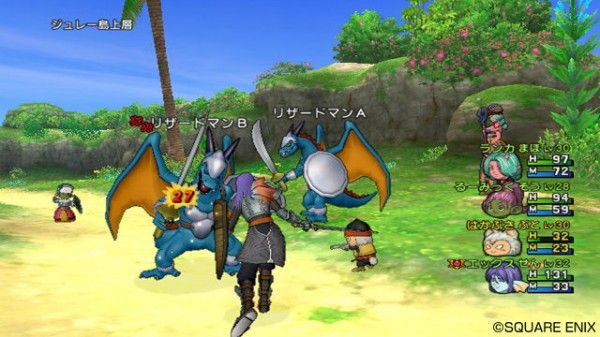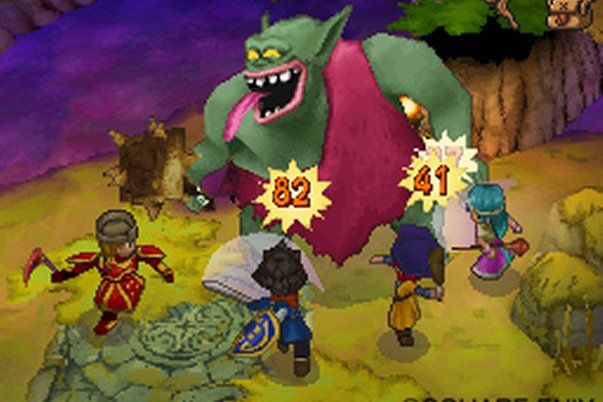The Dragon Quest series is one of the most beloved video game franchises in history. For almost thirty years the classic RPG series has delivered riveting adventures to millions of players around the world, maintaining a impossibly high standard of quality. The series recently made its debut on mobile platforms in the west with ports of Dragon Quest IV and Dragon Quest VIII, and Hardcore Gamer sat down with two figure heads of the franchise, executive producer Yu Miyake and mobile producer Noroyoshi Fujimoto, to talk about the past, present, and future of Dragon Quest.
[Hardcore Gamer] To start off, why do you think the Dragon Quest franchise has enjoyed such amazing and sustained success?
[Miyake] So, Dragon Quest 1, or Dragon Warrior, came out 28 years ago, and ever since then what Horii san, the creator of the series, has kept as a very strong focus is that the player is the hero, and you play the game as the hero that's adventuring throughout the world of Dragon Quest. And so you have that immersive experience, and they've continued to keep that as a very strong element. And not only Horii san, who handles all the script writing and scenario settings, but the artist, Akira Toriyama, and the composer, Mr. Koichi Sugiyama; they have a been a very vital part of the team as well. They have been very consistent, and continue to uphold that image that Horii san wanted to keep, and I feel that's how we were able to uphold that tradition and keep on going strong.
Do you find it hard to maintain that balance of tradition while also innovating and keeping things interesting as the series approaches its 30th year?
[Miyake] So definitely balance between the traditional and innovative is very difficult, and that's actually a focus point for the producer team who is trying to build the game and continue with the series. We want to do something new each time we put out a Dragon Quest game. So for example Dragon Quest VIII, when it first came out, we introduced a sort of cell-shading for the character image. It was a challenge to take Akira Toriyama's artwork and recreate it in realistic 3D and add that kind of effect to it. Another example is Dragon Quest 9 when we introduced communication tools, that was something innovative as well. So while keeping the storyline as the core and building upon it, we always want to kind of incorporate some new element to it. We also keep in mind that we want to make it user friendly, and to have as many people play it at the same time, as well as keeping in mind that the player is the hero adventuring in that world. And so we wanted it to feel very recognizable as a Dragon Quest game with each iteration, but still incorporating new elements, like adapting to new hardware specs or to take in technology trends or things like that.
Since Dragon Quest VIII brought the series into 3D, and IX onto handhelds, and X introduced MMO elements, what do you think the next step for the series is?
[Miyake] This is a really good question, and we've been kind of thinking really strong and hard, and we've kind of started to formulate which direction they want to go in, but of course I'm afraid we're not able to disclose anything at this moment, but we have an idea. But as you may have seen in Dragon Quest VIII, IX, and X, every time it's something exciting, something that kind of surprises and takes people aback for a little bit. So I'm very confident our next step will be something just as exciting if not more, while bringing in new players and old players alike.
Dragon Quest VIII and Dragon Quest IV are now on mobile, and that's brand new territory for the series. What were some of the challenges you faced while bringing those games to the mobile platform?
[Fujimoto] So one of the biggest differences is smart phones are not a control pad. You don't have your directional keys or buttons you would have on a console platform, so that was a very big hurdle we had to overcome, to figure out how we could make that user interface more friendly to a touch screen. So just doing research on making the directional controls more compatible with a touch screen took about a year to get it refined to where we wanted it to be. One of our goals was to make it just like any other casual game where you would play with one hand, like Candy Crush; you can just simply hold it one hand and you can be scrolling with your finger, and it's a very simple and easy interface to use. We thought "Wouldn't that be great to have that sort of setup for an RPG", so that's another thing we kept in mind and tried to take on that challenge and make it applicable to a Dragon Quest game and make it a game you could play with one hand. The other challenge was to keep the size of the game itself containable. When we were developing it, it was somewhere upwards of 4GB, and for a smart phone application we needed to be under 2GB. So even until very close to the end of the development phase we were trying to squeeze it down so it would be more manageable. It reminded us about when we were developing for the Nintendo game systems where we had a very limited capacity.
Now that you're more comfortable with developing for the mobile platform, do you think we could see a Dragon Quest title designed purely for mobile?
[Miyake] Actually, in Japan we've already released a title that's new to the mobile platform, not a port of a past title, and it's actually doing quite well. Unfortunately we're not sure how it compares with the North American market; it's probably pretty different, so we still have to evaluate the business aspect of it. We would like to do new titles that are made specifically for the mobile platform, and we already have a couple titles in the works.
Speaking of the North American market, do you think we'll see Dragon Quest XI come to the West?
[Miyake] We're pretty sure that Dragon Quest XI will see some sort of western release. We would have loved to have released X as well, but in that case because it's an MMO the operation part of it is very difficult to manage between regions. But yes, we're hoping XI will be available in the western regions.
Dragon Quest began as a console based series, and has since gone on to appear handhelds and now the mobile platforms. Where do you personally feel the series is most at home?
[Miyake] So the concept of where or what platform Dragon Quest lies is actually based more on the fact that we'd like Dragon Quest to be played by as many people as possible, so we'd put it on the most popular platform of its time. Nowadays people are sort of scattering to different devices, and we want to branch out to those platforms as well. So it's not a concept of what singular console or platform the series is most at home on, but that we want to go to the people.
The Dragon Quest series has had such a wonderful relationship with Nintendo in the past, but in the current climate do you think you'll have to look elsewhere to bring the next game?
[Miyake] The potential is definitely there to look into other platforms, like for example Dragon Quest VIII was on the PlayStation 2 originally. There's always opportunities, so we'd like to keep an open mind.
You both have great histories with this franchise, but what are some of your personal highlights from working with Dragon Quest?
[Miyake] I only have bitter memories. (Laughs)
[Fujimoto] With each title, it's never a simple process. It never goes smoothly, and sometimes you just want to throw it all away (pretends to flip the table in frustration). For example with VIII, we got to the point where it was such a mess that we were contemplating canceling the project, it got that bad at one point. But we strived on, so regardless of being a port or a remake or a brand new title, we've always had those struggles and we had to overcome them to bring out a new game.
[Miyake] It might not be an answer to what you're asking, but my personal experience is that with each Dragon Quest title you of course have your main, numbered sequence series, and you've got the ports and remakes, as well as new titles like web-based games, and Horii-san is part of each title. Whether he's writing up bits of it or he's supervising it and checking on the quality of the game, that's something I enjoy very much because Horii-san is such a big part of the development of each game.
[Fujimoto] In Japan, there's such a large amount of people playing Dragon Quest, and with Dragon Quest IX you would have the StreetPass function where you would have people interact with communications that way, and with Dragon Quest X you have people interacting with each other online. Seeing the enormous amount of people playing the game is a huge motivation to me, and it's very exciting to see there are so many people playing and enjoying the game. Of course you have the good comments, but you also have the bad, and people can get very harsh online, but the fact that there is a group of people that are so interested in Dragon Quest, whether it be good or bad, you know that people are continuing to follow that franchise, and it's very inspiring. I received a random phone call from a 7-year old gentleman saying "I can't clear this section of Dragon Quest, help me!" (laughs). So, a whole wide range of people are playing this game, which is really exciting. Mr. Koichi Sugiyama is 87 years old now, but he plays Dragon Quest himself; we've got people from older generations playing as well.
Dragon Quest is a cultural phenomenon in Japan, but what are your personal favorite Dragon Quest games?
[Miyake] My favorite is Dragon Quest X. I've put in about 1700 hours total. I've played through all of the games because I've worked on them, but I think that's the longest I've spent on any one game.
[Fujimoto] My favorite is Dragon Quest III. It was the first Dragon Quest game I purchased with my own money, and I was in elementary school when I got the game. I'm really proud of not only getting that game, but I loved it so much that when I went to apply for Enix, I said "I want to make a game like Dragon Quest III." So I had this really strong intention to be a part of Dragon Quest, and I'm glad that now I get to work on these games.
Did you skip school to buy Dragon Quest III?
[Fujimoto] (Laughs) You know me all too well! Yeah, I did.
Aside from Dragon Quest, what is your favorite game?
[Miyake] I'm playing Dragon Quest X, and I'm putting in thousands of hours. I don't have time to play any other games. I also play Candy Crush a lot.
[Fujimoto] My favorite game is Assassin's Creed. When you go into a town, usually you see houses and buildings and it's just a facade; you can't interact with it. But in Assassin's Creed, you can climb up to the rooftops and sometimes that's even where a quest would happen. So I really like that even the buildings are part of the game and you're interacting with them.
With Dragon Quest XI *probably* coming to current-gen consoles, what excites you most about the new platforms?
[Miyake] In terms of the Dragon Quest games, it's not too big of a focus for us to see how far we can push the limits of a platform. It's more about what the players will find interesting, and focusing on what we can do to make the player's experience more enjoyable. Though in terms of whether the specs of a new platform or generation is not too big of a focus for the Dragon Quest series, in Japan Dragon Quest X is going to launch with a new element on 3DS, and will use cloud technology to interact. So of course we're trying new things, but the specs of the hardware itself is not too big of a focus, regardless of what generation we're in.
If you two could be any character in the Dragon Quest universe, who would you be?
[Miyake] I'd like to one of the villagers, or maybe a weapon smith.
[Fujimoto] Torneko. I'd like to travel around the world to sell gear and weapons.





